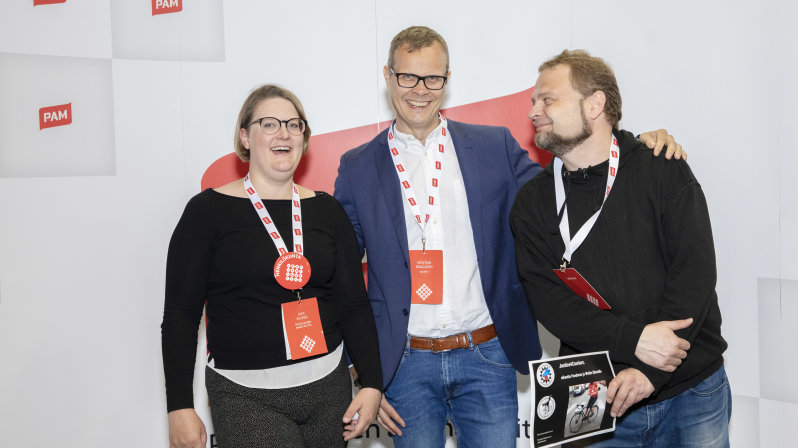There is a need for clear rules for platform work
In the government programme, which was published yesterday, the challenges connected to digital platform work does not go unnoticed. The matter was discussed as well at a theme seminar at PAM’s Congress Union earlier today. The speakers at the seminar were Nordic Union NU-HRCT’s Secretary General Kristjan Bragason, representative for Justice4Couriers Matti Mamia and PAM’s lawyer Suvi Vilches. Ann Selin, PAM’s President, opened the seminar.
According to PAM, it is important that, irrespective of the form of employment, minimum working conditions for employees, decent working conditions and well-being at work, are maintained in the future. This objective is also closely connected to the debate on the conditions of digital platform workers. PAM aims to increase the employer's presumption of labour legislation in order to improve the working conditions within platform work.
“PAM has been holding at hand the platform economy, and it is good that this has been taken into account in the new government programme. However, it is important that this is dealt with extensively, that the phenomenon is analysed and that changes are not just about possible legislative changes, but that we seek sustainable solutions. At the moment, we have workers in the platform economy, who have entrepreneurial and employee responsibilities, but there is no clarity about the rights”, concludes PAM President Ann Selin.
“Over the past five years, we have seen a significant increase in the services provided to platform tourists. Short-term overnight stays, restaurant and cafe services, food transport and so on. We have noticed that new technology also changes the way tourists, for example, act, as well as, products and services change offered by the company. Most importantly, however, the new technology changes the way employees are employed. Technology creates opportunities, but also brings challenges. We need to search for solutions as soon as possible”, explains Kristjan Bragason, Secretary General of the Nordic Union NU-HRCT.
“Platform work has become the new standard on many levels, many of which will go even unnoticed when used as an order for a ride or a pizza delivery at home on weekends. For some people, platform economy is the only place at the moment to secure a job, while for others it's just a way to earn a little extra. That's why the subject is complex”, Bragason continues.
According to forecasts, it is possible that by year 2050, half of those working in the United States and the United Kingdom will be self-employed and will work especially on platforms. The sudden rise in potential unemployment can have a significant impact on the employment impact of the platform economy - and that is why it is important that we make rules for these platforms now and not later”, says PAM lawyer Suvi Vilches, explaining the urgency of the matter.
“Platform companies advertise themselves by flexibility. This is a rhetoric that has to be listened to critically, asking what flexibility really means. Flexibility should not mean that the employee loses control of his own work and the time he goes to work”, Vilches continues.
However, in the regulation of platform work there is not only a question of lack of rights, but also a need to ensure that there is no possibility to discriminate in the structures, for example based on the employee’s background.
“Studies show that there may be less discrimination in the platform economy than in other sector companies, but at the same time, there are several examples that people in platform work may be at a disadvantage, for example, because of their immigrant background, and when negotiating their terms of employment, and later securing an employment”, says Suvi Vilches.
The Justice for Couriers campaign is a campaign launched by riders to improve the working conditions and conditions of food couriers working in the platform economy. Since September 2018, the campaign has actively promoted information about the everyday life of the riders.
“Our campaign will strive to influence until there is a possibility to agree on a collective agreement and become an employee in the platform economy”, says Matti Mamia, representative of the Justice for Couriers campaign.
“Last year in Italy and Germany, the EFFAT (European Federation of Food, Agriculture and Tourism Trade Unions), achieved together with the local trade unions, a Food Workers' and Delivery Hero Works Council. We are still awaiting the outcome of the initiative, but I believe that this is a step towards better negotiation. In Denmark, the local trade union 3F has agreed on a collective agreement with Hilfr.dk, a company for household workers. The agreement allows the company's freelance employees to apply for the status of an employee, if they so wish”, encourages Kristjan Bragason.



